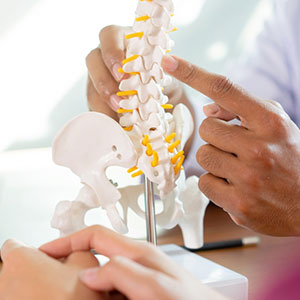Spinal health is vital for overall well-being as the spine serves as the central support structure for the body, protecting the spinal cord that transmits nerve signals between the brain and the rest of the body. A healthy spine ensures proper posture, mobility, and flexibility, which are essential for daily activities and physical fitness. Maintaining spinal health reduces the risk of chronic pain, herniated discs, and nerve compression, all of which can significantly impair quality of life. Good spinal health also promotes better circulation and nerve function, contributing to overall health and vitality. Preventive measures such as regular exercise, proper ergonomics, and good posture are crucial in avoiding spinal issues. Additionally, addressing spinal problems by Dr. Prashanth Chalasani, who is one of the Best Orthopedic Doctor in Vijayawada early can prevent long-term complications and improve recovery outcomes. Ultimately, prioritizing spinal health supports an active, pain-free lifestyle and enhances longevity by maintaining the body's structural integrity and function.
When to visit a spine specialist ?

Consult Best Spinal Surgeon in Vijayawada for spine problems immediately if you experience severe or worsening pain that does not improve with rest or medication, as it may indicate a serious condition such as a fracture or infection. Seek medical attention if you notice numbness, tingling, weakness, or loss of sensation in your arms or legs, which could suggest nerve damage or spinal cord compression. If you develop bladder or bowel control issues, such as incontinence or difficulty urinating, prompt medical evaluation is essential to prevent permanent damage. Persistent pain lasting more than a few weeks despite conservative treatment warrants professional assessment to identify underlying causes. Sudden, severe pain following trauma or injury, such as a fall or accident, requires urgent medical evaluation to rule out fractures or dislocations. Additionally, if you experience unexplained weight loss, fever, or night sweats along with back pain, these could be signs of infection or malignancy needing immediate investigation. Chronic back pain that interferes with daily activities or sleep should also be evaluated by a healthcare professional. Finally, if you notice deformities, such as visible spinal curvature or swelling, or if your pain is associated with neurological symptoms like vision changes or difficulty walking, consult a doctor promptly for appropriate diagnosis and Spine Injury Treatment in Vijayawada.
Major types of spine disorders:
- Herniated Disc: Occurs when the nucleus pulposus protrudes through the annulus fibrosus, causing nerve compression and pain, often in the lumbar or cervical regions.
- Degenerative Disc Disease: Age-related deterioration of intervertebral discs leading to chronic pain, reduced mobility, and possible nerve impingement.
- Scoliosis: A lateral curvature of the spine that can be congenital, idiopathic, or neuromuscular, causing deformity, imbalance, and sometimes respiratory issues.
- Kyphosis: Excessive outward curvature of the thoracic spine, resulting in a hunchback appearance; can be due to osteoporosis, trauma, or congenital factors.
- Lordosis: Excessive inward curvature of the lumbar spine, often associated with obesity, pregnancy, or muscular imbalances.
- Spinal Stenosis: Narrowing of the spinal canal, compressing the spinal cord or nerve roots, causing pain, numbness, and weakness, typically in older adults.
- Spondylolisthesis: Forward slipping of one vertebra over another, leading to instability and nerve compression, often causing lower back pain.
- Ankylosing Spondylitis: A chronic inflammatory disease causing fusion of the vertebrae, leading to reduced flexibility and a hunched posture.
- Spinal Fractures: Breaks in vertebrae usually due to trauma or osteoporosis, potentially leading to instability or neurological deficits needs an evaluation from Orthopedic Surgeon in Vijayawada.
- Infections and Tumors: Conditions like spinal tuberculosis, osteomyelitis, or metastatic tumors can affect spinal integrity and function, causing pain and neurological impairment.
Some commonly performed spinal surgeries:
- Discectomy - Removal of herniated disc material pressing on nerve roots, often used for herniated discs causing radiculopathy.
- Laminectomy - Removal of the lamina portion of vertebrae to relieve spinal stenosis and decompress neural elements.
- Spinal Fusion - Joining two or more vertebrae using bone grafts, hardware, or cages to stabilize the spine, often performed for degenerative conditions, fractures, or deformities.
- Vertebroplasty and Kyphoplasty - Minimally invasive procedures by Orthopedic Doctor in Vijayawada to stabilize fractured vertebrae using bone cement, primarily for osteoporotic fractures.
- Scoliosis Surgery - Corrective procedures such as posterior spinal fusion with instrumentation to straighten abnormal spinal curvatures.
- Foraminotomy - Widening of the neural foramina to relieve nerve compression caused by foraminal stenosis.
- Artificial Disc Replacement - Replacing a degenerated disc with an artificial one to preserve motion, typically in the cervical or lumbar spine.
- Osteotomy - Surgical cutting and realignment of bones to correct deformities, especially in severe scoliosis or kyphosis cases.
- Spinal Cord Stimulator Implantation - Placement of devices to manage chronic pain by stimulating the spinal cord.
- Tumor Resection - Removal of spinal tumors, sometimes combined with stabilization procedures.
If you or someone you know is suffering from spine problems, help them get in touch with spine specialist at Bezwada Hospitals for precise diagnosis, management and treatment.
Have any Query or Need more Information
